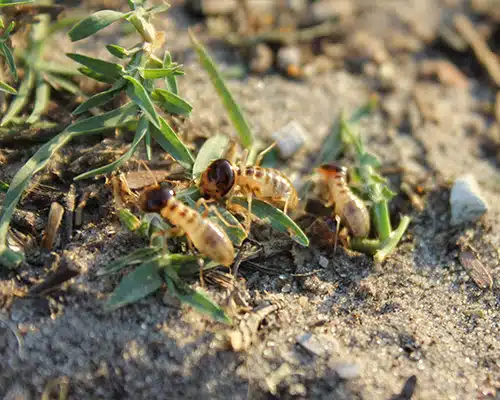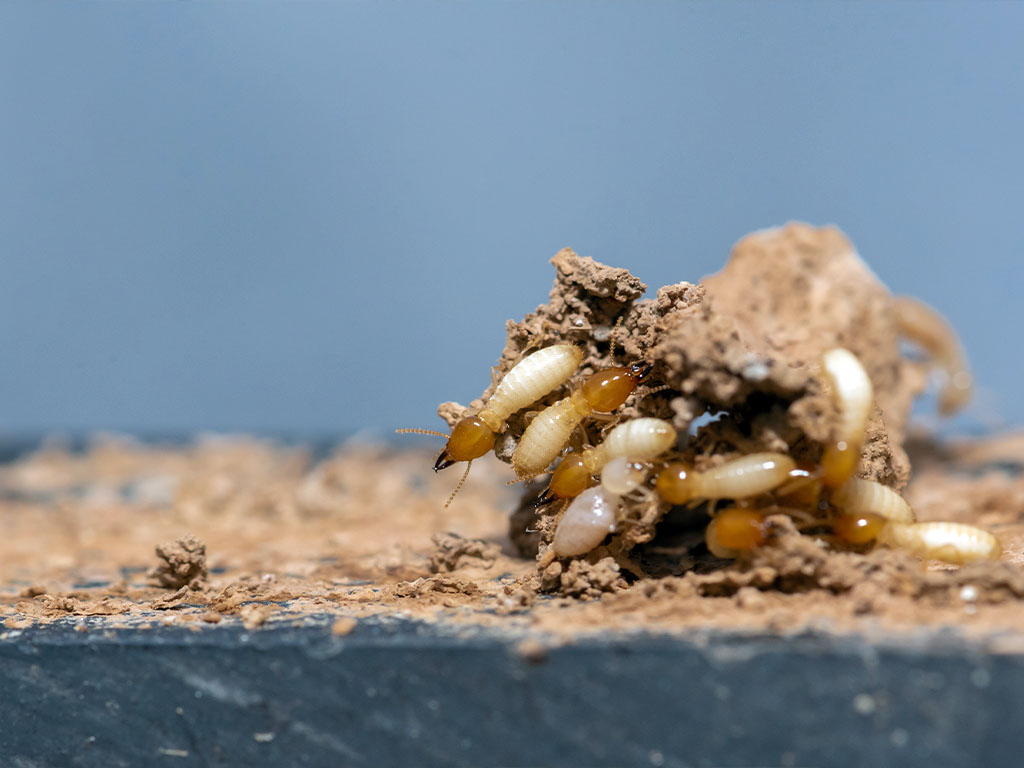Harvester Termites
Get Free Quote
What are Harvester Termites?
Harvester termites are a type of termite known for their habit of collecting and storing plant material, primarily grass and other vegetation. Unlike other termite species that feed directly on wood, harvester termites gather their food from the environment and bring it back to their nests. These termites are typically found in arid and semi-arid regions where they play a crucial role in the ecosystem by breaking down and recycling plant material. Their colonies are often large and can cause significant damage to crops and grasslands.
In South Africa, harvester termites are primarily found in outdoor environments rather than inside homes. They are more likely to infest gardens, agricultural lands, and areas with abundant vegetation. While they generally do not pose a direct threat to the structural integrity of buildings, they can cause damage to lawns, gardens, and landscaping by stripping plants of their leaves and stems. Homeowners in South Africa should be aware of harvester termites, particularly if they have extensive gardens or live near agricultural areas, and may need to take preventive measures to protect their vegetation from these pests.
Why Are Harvester Termites at My Property?
Harvester termites might be at your property primarily due to the availability of their preferred food sources, which include grass, leaves, and other vegetation. These termites are known for their foraging behavior, where they collect plant material to bring back to their nests. If your property has lush gardens, lawns, or an abundance of vegetation, it provides an ideal environment for harvester termites to thrive. They are particularly attracted to areas where there is an ample supply of grasses and other herbaceous plants, which they can strip for food.
Another reason harvester termites may be attracted to your property is the presence of suitable nesting sites. Harvester termites build their nests underground, often in areas that offer both protection and easy access to food. Properties with well-irrigated lawns, gardens, and landscapes can inadvertently create favorable conditions for these termites to establish their colonies. Additionally, if there are organic debris or mulch around your property, it can further attract harvester termites by providing additional food resources and a conducive environment for nesting.
Environmental factors also play a significant role in the presence of harvester termites. These termites are commonly found in arid and semi-arid regions, which means that properties in such climates are more prone to infestations. Seasonal changes, such as the onset of the rainy season, can increase termite activity as they seek out new foraging grounds. If your property is located in an area that experiences dry spells followed by rain, it may create the perfect conditions for harvester termites to move in and start foraging. Understanding these factors can help explain why harvester termites are at your property and highlight the importance of monitoring and managing their presence.

Risks Associated with Harvester Termites
Harvester termites pose several dangers and risks, primarily to vegetation, landscapes, and agricultural areas. Their feeding habits can lead to significant damage to lawns, gardens, and crops. Unlike wood-eating termites, harvester termites focus on collecting and consuming plant material such as grasses and leaves. This behavior can result in the stripping of vegetation, leaving bare patches in lawns and damaging ornamental plants and crops. Such damage can be particularly problematic for farmers and gardeners who rely on healthy vegetation for their livelihoods or aesthetic purposes.
Another risk associated with harvester termites is the potential for soil erosion. As these termites remove vegetation, they can disrupt the root systems that help hold the soil in place. This can lead to increased soil erosion, especially in areas with loose or sandy soil. Soil erosion can have a cascading effect, leading to further degradation of the land, reduced soil fertility, and increased runoff, which can harm nearby water bodies and ecosystems.
Furthermore, harvester termites can indirectly affect the local ecosystem and biodiversity. By consuming large amounts of plant material, they can alter the composition of plant communities, potentially reducing the availability of certain plants that are crucial for other wildlife. This can have a ripple effect on the local food web, impacting species that rely on those plants for food and habitat. Additionally, the presence of large termite colonies can attract predators, which might disrupt the balance of local wildlife. Overall, while harvester termites do not pose direct structural risks to buildings, their impact on vegetation, soil stability, and local ecosystems can be substantial and warrants careful management.
Request A Free Quote
What are the steps to Subterranean Termite Control

Accend Solutions employs a comprehensive and systematic approach to effectively eliminate harvester termites from your property. Here are the detailed steps involved:
1. Thorough Inspection and Assessment
- Site Survey: The process begins with a detailed inspection of the affected area. Accend Solutions’ technicians conduct a thorough site survey to identify the extent of the infestation, the specific termite species involved, and their nesting and foraging patterns.
- Identification of Nest Sites: Locating the underground nests is crucial. Technicians use specialized equipment to detect these nests, ensuring that the treatment targets the source of the infestation.
2. Customized Treatment Plan
- Assessment Report: Based on the inspection findings, a comprehensive assessment report is generated. This report outlines the severity of the infestation, the areas affected, and the recommended treatment plan.
- Tailored Solutions: Accend Solutions designs a customized treatment plan tailored to the specific needs of the property and the nature of the infestation. This plan considers the type of vegetation, the layout of the land, and any environmental factors.
3. Chemical Treatments
- Soil Treatment: One of the primary methods used is soil treatment with termiticides. Technicians apply these chemicals to the soil around the infested areas, creating a barrier that prevents termites from accessing their food sources.
- Bait Systems: In areas where direct chemical application is not feasible, baiting systems are installed. These bait stations attract termites, which then carry the toxic bait back to their colony, effectively eliminating the entire nest over time.
- Direct Nest Treatment: If nests are accessible, technicians directly treat them with termiticides to ensure that the entire colony is eradicated.
4. Physical and Environmental Controls
- Habitat Modification: To prevent future infestations, Accend Solutions recommends and implements habitat modifications. This may include removing excess vegetation, maintaining a proper distance between plants and buildings, and ensuring that organic debris is regularly cleared.
- Soil Aeration and Moisture Control: Technicians advise on proper soil aeration and moisture control techniques to make the environment less conducive to termite habitation.
5. Monitoring and Follow-Up
- Regular Monitoring: After the initial treatment, Accend Solutions provides regular monitoring services to ensure that the termites do not return. This includes periodic inspections and maintenance of bait stations.
- Follow-Up Treatments: If any signs of termite activity are detected during follow-up inspections, additional treatments are carried out promptly to address the issue.
6. Preventive Measures and Education
- Client Education: Accend Solutions educates property owners on preventive measures to keep harvester termites at bay. This includes guidance on landscaping practices, soil management, and early detection signs.
- Preventive Treatments: In some cases, preventive treatments are applied to protect the property from future infestations. This can involve periodic soil treatments and the strategic placement of bait stations.
Accend Solutions is Available 24/7 for Emergency Pest Control including Gecko Control in Gauteng and North-West Provinces in South Africa.
email: info@accend.co.za
call: 068 474 7303
FAQs on Termite Control (Harvester Termites)
We know you may have questions about Harvester Termites in general and how Pest Control for Harvester Termites work. We have compiled a few FAQs on Harvester Termites that might clear the confusion.
CLICK HERE FOR FAQs ON HARVESTER TERMITES/ HARVESTER TERMITES CONTROL
Q: What are harvester termites?
Harvester termites are a type of termite that primarily feeds on grasses, leaves, and other plant materials rather than wood. They are known for their ability to strip vegetation, making them a concern for gardens, lawns, and agricultural areas.
Q: How can I identify if I have harvester termites on my property in Johannesburg, Roodepoort, or Randburg?
Signs of harvester termites include stripped vegetation, particularly grass and leaves, around your property. You may also notice mud tubes or tunnels leading from the ground to the infested plants. Additionally, seeing large numbers of winged termites or termite swarms near vegetation can indicate an infestation.
Q: What risks do harvester termites pose to my property in Johannesburg?
Harvester termites can damage lawns, gardens, and crops by feeding on and stripping vegetation. This can lead to unsightly patches in your lawn or garden, as well as reduced plant health and growth. Additionally, their presence can contribute to soil erosion in areas with loose or sandy soil types.
Q: How does Accend Solutions conduct harvester termite inspections in Johannesburg, Roodepoort, and Randburg?
Accend Solutions performs thorough inspections to detect harvester termite infestations. This includes identifying areas of stripped vegetation, checking for mud tubes or tunnels, and using specialized equipment to locate termite nests underground.
Q: What methods does Accend Solutions use for harvester termite control in Johannesburg?
Accend Solutions employs various effective methods for harvester termite control, tailored to the specific needs of properties in Johannesburg, Roodepoort, and Randburg. This includes targeted soil treatments with termiticides, installation of baiting systems to eliminate colonies, and strategic nest treatments where accessible.
Q: Is harvester termite control by Accend Solutions safe for my family and pets?
Yes, Accend Solutions prioritizes safety in their pest control methods. The products and techniques used for harvester termite control are environmentally friendly and designed to minimize risks to humans, pets, and surrounding ecosystems.
Q: How long does harvester termite treatment take to eliminate the infestation?
The duration of harvester termite treatment varies depending on the severity of the infestation and the specific methods used. Accend Solutions provides a timeline during the initial inspection and keeps clients informed throughout the treatment process.
Q: Can I prevent harvester termites from returning to my property in Johannesburg, Roodepoort, or Randburg?
Accend Solutions offers preventive measures to help minimize the risk of harvester termite re-infestation. This includes habitat modifications, soil management techniques, and ongoing monitoring to detect and address potential termite activity early.
Q: What should I do if I suspect I have harvester termites on my property in Johannesburg?
If you suspect a harvester termite infestation, contact Accend Solutions immediately for a professional inspection and assessment. Early detection and prompt treatment are key to minimizing damage and protecting your property from further infestation.
Q: How can I schedule a harvester termite inspection or treatment with Accend Solutions in Johannesburg, Roodepoort, or Randburg?
To schedule a harvester termite inspection or treatment with Accend Solutions, you can contact us directly our website or phone. A qualified technician will arrange a convenient time to visit your property, conduct an inspection, and provide tailored recommendations for termite control.
Call For Free Quotes
We do more than Subterranean Termites
Available In All of Gauteng
Always at your service, wherever you are!
- Midrand
- Merose Arch
- Mellville
- Muldersdrift
- Paulshof
- Parktown
- Randburg
- Roodepoort
- Sandton
